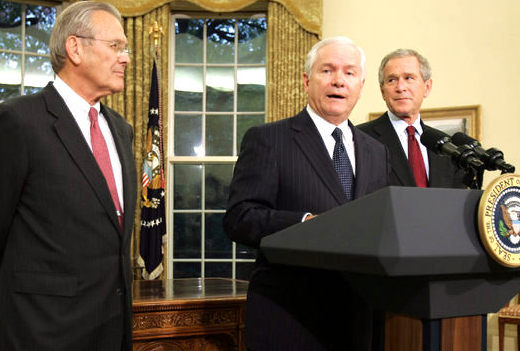 |
|
Robert Gates, nominee of Defence Secretary tolds at a press conference held in the White House on November 8 with out-going secretary Donald Rumsfeld to his right side. AFP, Yonhap
|
Troop realignment, wartime control issues up for contention
How much of a change will be seen in dealing with security issues on the Korean peninsula following the departure of U.S. Defense Secretary Donald Rumsfeld? Experts say there may be no deviation from the plan to realign U.S. troops stationed in South Korea, nor the plan to return wartime military control to Seoul, but there is a possibility that the timeframe for the wartime control handover may be slightly altered. In determining any possible changes, experts stressed the importance of examining what role will be given to U.S. deputy assistant defense secretary Richard Rollins. For now, Rollins is expected to move to the position of deputy assistant secretary for the East Asia-Pacific region. If Rollins plays the role of reporting Korea-U.S. affairs to his boss, incoming defense secretary Robert Gates, the scope of the change will be lessened further, as Rollins largely tows the present line of the administration. At first, experts say, South Korea may gain an upper hand in regaining wartime control in 2012 - Seoul’s desired timeframe - as opposed to the U.S. proposal of 2009. Ham Taek-yeong, a professor at the North Korean Graduate School, said that "the U.S. may lower its level of demand; in particular, the possibility is higher for the timing to be adjusted."This view is based on speculation that Rumsfeld’s personal opinion has been the factor behind the rapid speed of change surrounding the Korea-U.S. military alliance. "Recently, Rumsfeld’s opinion had significantly been reflected in Korea-U.S. military issues," said an expert at the Korea Military Research Institute. "He has shown disappointment and discomfort about [the current situation between the U.S. and] South Korea." However, no large change is expected overall, as the realignment of U.S. forces stationed here and the return of wartime control are part of a global change in U.S. military strategy. Inha University professor Nam Chang-hi said, "The Bush administration has already begun realigning its troops overseas, turning them into quickly deployable forces in the name of counterterrorism. Rumsfeld played a role in implementing this strategy." In addition, with the reduction of U.S. troops on South Korean soil and the exchange of wartime control joint decisions between Seoul and Washington, Professor Nam said the departure of Rumsfeld will not significantly alter those plans. In the wake of Rumsfeld’s departure, some U.S. Democrats and Army staff may raise the question of the value of the military realignment plan, arguing that U.S. ground troops should remain at their current level in South Korea. This speculation is related to the perceived personality of the incoming defense secretary. According to an expert at the Institute of Foreign Affairs and National Security, "While Rumsfeld stressed the importance of the navy and air force, Gates believes in the importance of ground troops." [englishhani@hani.co.kr]





